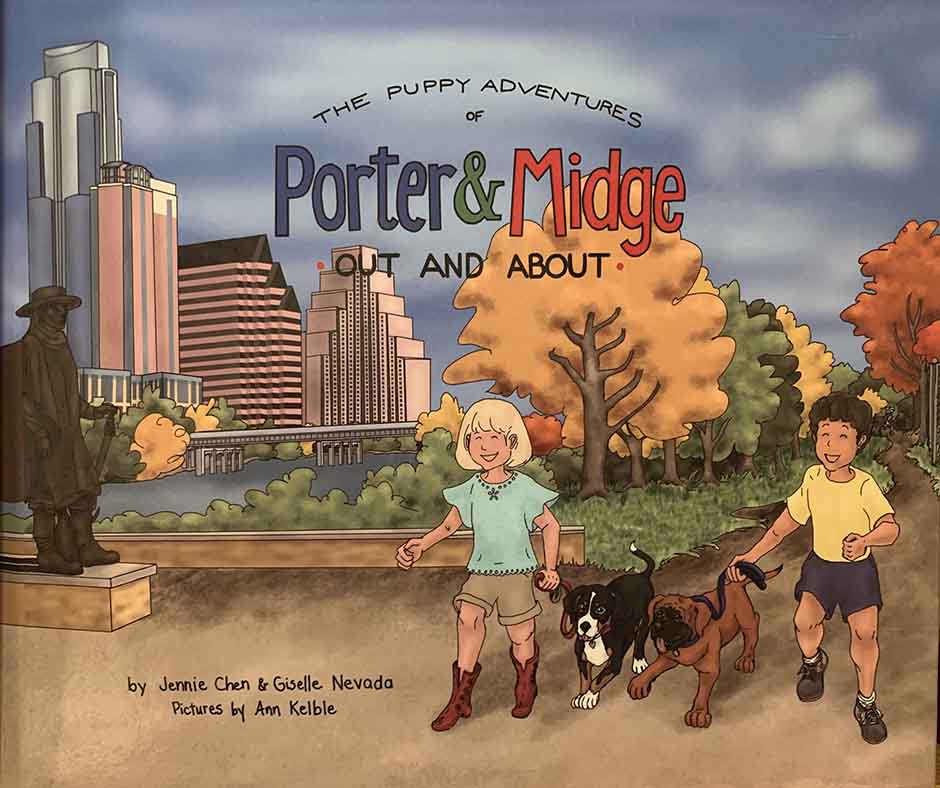583 – Book Teaches Children How to Train and Socialize a Puppy
Book Teaches Children How to Train and Socialize a Puppy

Authors Giselle Nevada and Jennie Chen join host Laura Reeves to share the story of their new book, “The Puppy Adventures of Porter and Midge – Out and About,” a book about two puppies who go on adventures, written by dog people to share with the general public.
“As dog people, these dogs are our lives,” Chen said. “Our entire lives revolve around them. So our way of communication is certainly at a different level because we’ve got the depth of knowledge that the general public doesn’t necessarily have. They might have a couple of pets throughout their lifetimes, where we’ve got dogs that we train, show, live with us, live with somebody else, and those sorts of things.
“So being able to communicate to someone who can only take a tiny snippet of what we understand in the dog world is so difficult. And then trying to translate that to a child who may not have all of the communication skills and mobility skills. How do we communicate these ideas to kids, to this different audience, so that as they grow, these are the things that are really important? What does a puppy see when they’re out in public? So yeah, we’re very passionate about this.”
The dog “characters” in the book are a Mastiff and a Greater Swiss Mountain Dog, the breeds Nevada and Chen own. The two friends met while living in Austin, TX, and developed this project from their combined passions.
“You will see a lot of people who are in the dog world also drawn in,” Chen added. “They may not be the characters, but they may be the people you know walking around on the street, the veterinarian, other people, and other dogs that you may already know from the show world. So we try to incorporate a lot of that. We also want to incorporate a lot of the breeds that aren’t as well known, like we have a Bouvier in there.
“We really wanted to speak to a different audience. Because it’s not just, ‘Oh, this is what I’m to do with an adult.’ This is what we need to do as a puppy. And now you layer on a kid, How do you get a kid to understand that? Because they don’t understand the same things we understand. They’re not able to pick up the visual cues, the body language that dogs have. How do we introduce them to this idea of socialization?”
Listen to the entire episode for more details or watch on YouTube.
555 – Dr. Gayle Watkins LIVE: Socializing Puppies Properly
Dr. Gayle Watkins LIVE: Socializing Puppies Properly
Four-time AKC Breeder of the Year in four different sports, Dr. Gayle Watkins, founder of Avidog, speaks about how we create working and competition dogs through proper socializing.
Watkins observes that socialization is building social relationships with humans and dogs. And the current method of socialization causes more harm than good. Puppy development should be manners, mental resilience, civility and trust, she posits.
“The vast majority of people think socialization ends at 16 weeks, the sensitive period. Those first four months so important to puppies. But most dogs need socialization or “development work” through 15 months,” Watkins said.
Another misconception Watkins notes is that 8 to 10 weeks is a fear *imprint* period, not a time in which dogs are necessarily more fearful.
“They’re not more afraid at that age,” Watkins said. “They’re going through continual progression towards fear that starts at 5 weeks. It’s what a canine is. They are fearful creatures. This is inherent in this species, so fear is inherent in dogs.”
“If you go online and you Google socialization and puppies, you’ll get a million hits, over a million hits, and you will get checklist after, checklist after checklist. This is not a checklist. We’re talking about teaching skills. What is stability? It’s the appropriateness of the dog’s response to stress.
“I also want to build resilience. Putting them under stress very, very early. So that they can be resilient. Resilience is the ability to bounce back from stress and frustration. If you think about it, we can’t make every puppy bombproof. More than anything else. It is built through inoculation to stress. When we are aiming for stability, we want to introduce stress to teach them the right behaviors. Here we must introduce stress to teach them to be resilient.”
Watkins’ insights on raising sensible, calm competition ready dogs is invaluable. Listen HERE to one of her first conversations on Pure Dog Talk, on bomb proofing your puppies.
556 – Building Trust with Your Puppy During Socialization
Building Trust with Your Puppy During Socialization
Dr. Gayle Watkins is back with part two of her presentation on proper socialization steps for raising competitive dogs.
Watkins emphasizes the need for the owner and puppy to build trust during early socialization. This means being a “control freak” about safe-guarding your puppy’s interactions with people, places and other pets.
“We are responsible for creating trust,” Watkins said. “We do it by being trustworthy and reliable. We are often not trustworthy with our dogs. Teach your puppy they can rely on you.
“Civility is the appropriateness of behavior around people and dogs,” Watkins added. “It is keeping your mouth shut, not biting anyone, not climbing on anyone. Not assaulting other dog or people as you are meeting. Civility is not the same as friendly. It does not require physical interaction. More important to teach our dogs indirect interaction, when they see a person or dog and do not interact.”
Getting puppies “out” to see urban centers, hear different noises and so forth does not also necessarily mean *meeting* other people and pets right away, Watkins noted. She also advocates for supervised puppy classes long before training classes begin.
Puppies handle stress best if we give them cues they can fall back on, Watkins said. If a situation is causing stress for the puppy, have them offer a sit and watch behavior, for example. She adds that forcing a puppy in to a situation that is clearly uncomfortable or scary for them can cause you to break the trust you are hoping to build with the puppy.
Watkins also discusses acquired fear or aggression in dogs that can actually be passed on in the whelping box – epigenetics is the name of this phenomena. Her emphasis on raising stable and trusting dogs springs from studies that indicate 80 percent of aggression is genetically based.
The bottom line, Watkins said, is that raising confident, stable puppies takes time, effort and commitment.



